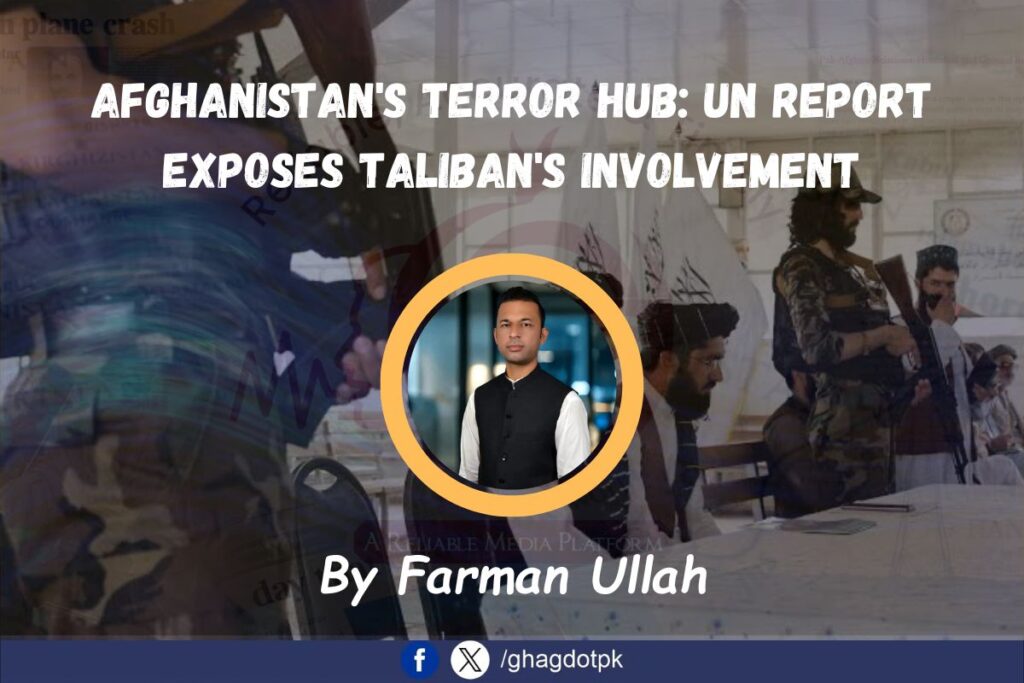By Farman Ullah
The resurgence of the Afghan Taliban has significantly impacted regional security, particularly in Pakistan, where terrorist activities have escalated. A recent report by the United Nations Analytical Support and Sanctions Monitoring Team underscores the Taliban’s role in facilitating cross-border terrorism, notably through their support for Tehrik-e-Taliban Pakistan (TTP). This development has further destabilized an already volatile region and heightened concerns over the growing security threats in Pakistan.
Taliban’s Support for TTP
The UN report reveals that the Afghan Taliban have increased their support for the TTP, providing safe havens and logistical assistance. This backing has enabled the TTP to plan and execute operations against Pakistani targets with increasing frequency and sophistication. The TTP’s activities have notably intensified in recent years, with a sharp rise in attacks on Pakistani security forces and civilian infrastructure. These attacks have not only claimed numerous lives but also instilled a sense of insecurity across the country.
The Taliban’s decision to offer refuge and support to the TTP has had a profound impact, with the latter benefiting from the Taliban’s control over Afghan territory. These havens allow the TTP to regroup, recruit, and rearm, making them an ever-present threat to Pakistan’s national security. According to the UN report, this collaboration has significantly contributed to the surge in terrorism across Pakistan.
Escalation of Terrorist Activities
The TTP’s growth as a major militant organization is deeply troubling. The group has become, in the words of the UN report, “the largest terrorist group” operating from Afghanistan, posing a significant threat to Pakistan’s stability. The 35th report by the team states that the status and strength of TTP in Afghanistan remain unchanged, while its attacks on Pakistan have increased significantly, with over 600 attacks recorded during 2024, including cross-border assaults from Afghan territory. The Taliban’s support to the banned outfit includes a monthly payment of 3 million Afghanis (approximately $43,000). These shocking statistics underscore the scale of the crisis, which continues to plague Pakistan and destabilize the region.
Pakistan witnessed a sharp increase in terror attacks in January 2025, surging by 42% compared to the previous month, according to data released by the Pakistan Institute for Conflict and Security Studies (PICSS), a think tank.
January saw two suicide bombings, both in Balochistan, which is the most affected region along with Khyber Pakhtunkhwa. The banned TTP claimed responsibility for one, while the proscribed BLA took credit for the other.
The increase in TTP-led violence has also strained Pakistan’s counterterrorism efforts, with security forces constantly engaged in combating a growing number of attacks. Pakistan has expressed grave concerns that the Afghan Taliban’s inaction—or tacit support—towards the TTP has exacerbated this crisis, forcing the country into a perpetual state of alert.
International Perspectives
The international community has shown varied reactions to the Taliban’s actions. Turkey’s President, Recep Tayyip Erdogan, has been vocal in condemning the Taliban for harboring terrorist groups that threaten regional security. He has emphasized the need for effective measures to counter terrorism emanating from Afghan soil, particularly against groups like the TTP.
Pakistan, meanwhile, has ramped up diplomatic pressure on the Taliban, urging them to take stronger action against the TTP and prevent it from using Afghan territory as a base for launching attacks on Pakistani soil. Pakistani officials have expressed frustration with the Taliban’s reluctance to curb these activities, with some warning that the continued support for the TTP could jeopardize the fragile peace in both Afghanistan and Pakistan.
Implications for Regional Security
The Taliban’s role in supporting the TTP has far-reaching consequences for regional stability. Tensions between Afghanistan and Pakistan have escalated, as Pakistan continues to confront cross-border terrorism. This development complicates peace efforts and undermines the prospects for lasting security in the region. The presence of terrorist groups like the TTP not only threatens the safety of civilians but also hinders regional cooperation and economic growth.
The international community faces a challenging task in addressing the Taliban’s actions while navigating the complexities of regional politics. The Taliban’s refusal to take decisive action against the TTP has strained relations with neighboring countries, leaving Pakistan in a precarious position as it grapples with the growing security threat.
A Call to Action
The Afghan Taliban’s involvement in supporting terrorist activities in Pakistan highlights the persistent and evolving threat to regional stability. The latest UN report underscores the urgency of coordinated international efforts to address this issue and mitigate its impact on Pakistan and the broader region. Without a unified response, the threat posed by the Taliban and their support for terrorist organizations like the TTP will continue to destabilize not only Afghanistan and Pakistan but the entire region.
The time for decisive action is now. The international community must come together to hold the Taliban accountable and ensure that they cease their support for terrorist groups operating from Afghan soil. Only then can there be hope for lasting peace and security in South Asia.






